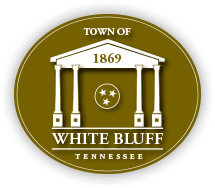Economic Development
White Bluff is OPEN for business.
White Bluff has so much to offer – proximity to Nashville, major highway access, reasonably priced and available land, willing workforce, utility availability, low taxes, high quality of life, affordable housing, great schools – the list goes on and on.
We recognize that economic development is critical to any community’s long-term success and White Bluff salutes and encourages the entrepreneurial spirit.
We are available to assist you in any way possible. Call White Bluff Town Hall at (615) 797-3131 or email us at office@townofwhitebluff.gov.
Community Development
White Bluff encourages community involvement and volunteerism. Community involvement has always been a cornerstone to our development. Please see our community-driven plans below.
- White Bluff Community Strategic Plan 2008
- White Bluff Community Strategic Plan 2012
- White Bluff Community Strategic Plan 2013
- White Bluff Community Strategic Plan 2020 (TVA)
- White Bluff Community Mobility Plan 2021
- 2044 White Bluff Comprehensive Plan (June 2024)
- White Bluff Safety Action Plan (July 2024)
- White Bluff Municipal Parks and Recreation Master Plan (January 2025)
- 2043 Dickson County Comprehensive Plan (November 2023)
- Middle Tennessee Rural Regional Transportation Plan (MTRPO/TDOT December 2023)
